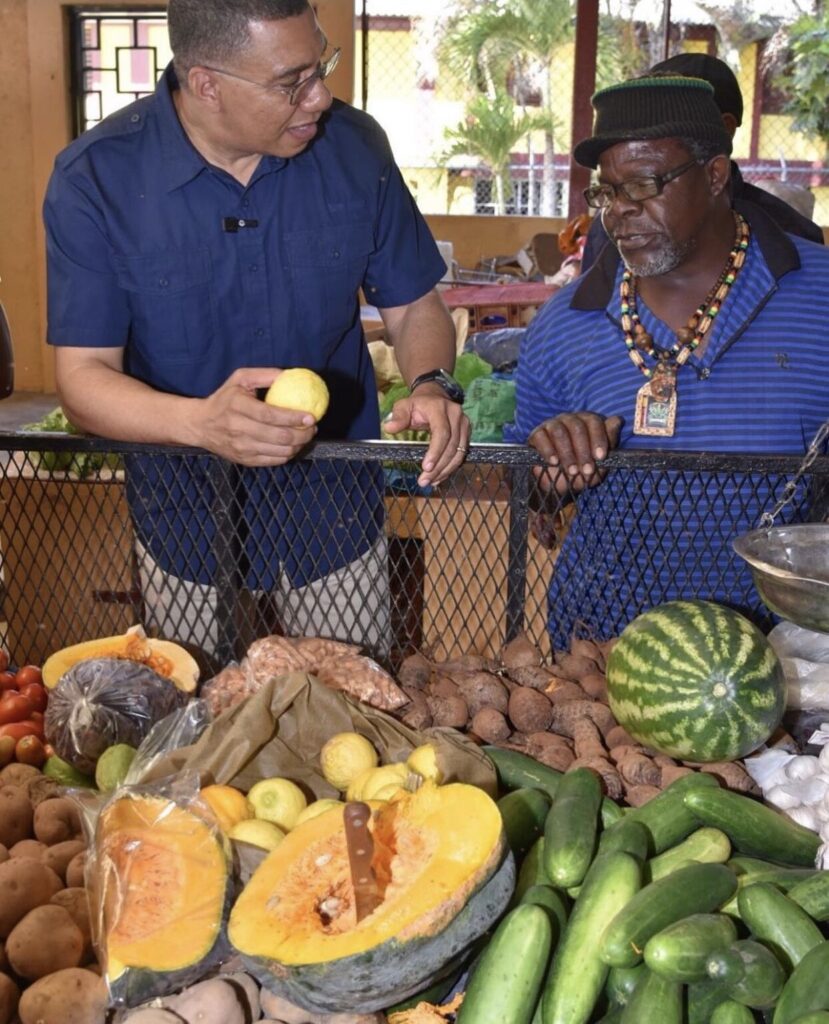Prime Minister Holness Tours Hopewell Market

Remarks
By
The Most Honourable Andrew Holness ON, PC, MP
Prime Minister of Jamaica
At the
Tour of Hopewell Market
On
January 19, 2024
————————————————————————-
Now, this is a relatively small market space, but it comfortably fits 30 persons including people who sell haberdashery goods, that’s amazing. Now, one of our areas of focus as a government is to improve what we call urban townships andparticularly looking at urban townships in rural areas.
Now, Hopewell is one such urban township in not so much rural area, but it is considered to be a rural area. The problem with Hopewell is that, again, it was an unplanned town. It just sprung up and it is a one town road, which happens to be the main road that connects the rest of the island to Negril if you’re coming from St James and it creates a really a serious blockage and it is a hindrance actually to the tourism industry because of the delays that it causes between the airport and trying to get to the resorts in Negril and in Hanover.
But aside from that, when I drive through the town, I note the inconvenience of just general commuters because it’s just so unplanned, but it is symptomatic of many other townships right across Jamaica, these urban townships in rural communities. So, one of the things we’re trying to do is to restructure them. So,we are planning several bypasses around these urban towns in rural areas, not to take away the business, but to make the towns more functional. So, when we do the bypasses, we’re also going to do improvements to the towns itself, which may involve the widening of the main street, finding designated parking, developing off roads so that we can have businesses moving because everybody’s clustered on the main road. So, we have to develop off roads that are walking roads so that businesses can feel that if they move from the front road to the side roads, which are walking roads that they will still have their customers. And an important thing, which is what we’re going to do first is to improve the markets in the towns.
The big challenge and we need to get the University of the West Indies or some of our other universities to study the sociology and psychology around market use. Why is it that even when you have well-built spaces, vendors andpurchasers choose to conduct their business outside of the market? The obvious thing, which we have all agreed on, is that the facilities themselves need to be improved. I have never been in the market on a market day. Today, a Friday, would probably be considered a market day, but on a weekend when you would have most customers coming through, so I don’t know how it actually works, but what I see here is very encouraging that all the vendors are in and there is no market vending, per se, outside of the actual precincts of the market and that is what we would like to achieve.
I am very pleased with the facility and the design, but I still hold out hopes that we’re going to be able to design our markets to much higher standards. I have been all over the world. I have gone to markets all over the world. And I’ve seen markets that they are so clean, so well kept, they have restaurants in them, they have entertainment in them; a true market, a true bazaar as they would call it and we want to reach that stage with our markets that people can feel free to do their business in the market because for one, the area is clean and sanitation is of the highest standard, the markets are functional, particularly, the aisleways are clear so people can walk, there is enough space that if you’re not walking and you’re browsing, then you can stand in the space for browsing the stall. The aisle space is not narrow, so you have space for walking and space for browsing. The vendors have space for secure storage. And not just to put the goods underneath the stall and lock it up, but proper storage that would ensure that the quality of the food is maintained and that the public health considerations are maintained.
And we also want the sanitary facilities to be of the highest standard. And I think that’s probably where we really need to start, that if we lift the sanitary facilities, it will generally just lift how people feel about the market. We tend to just view the market as a place that is just rudimentary, and we have to kind of change that view of the market.
I want to commend minister for the efforts he’s making in making improvements. In the budget to come, we will announce a programme for markets generally, particularly markets in urban townships of rural areas, and that will be seeking, as I’ve said, to deal with the sanitation and deal with the actual design of the facilities to ensure that they are functional, and that people use them.
The other important point to note is that we are already spending on our markets. This is one example, but there are others to come. I know that the KCAMC will be making some major announcements about the Coronation Market and other markets that they are going to do. So, in terms of a local government thrust, what matters to people, where people come and collide in a town is in the market and we are going to improve the conditions of our markets.